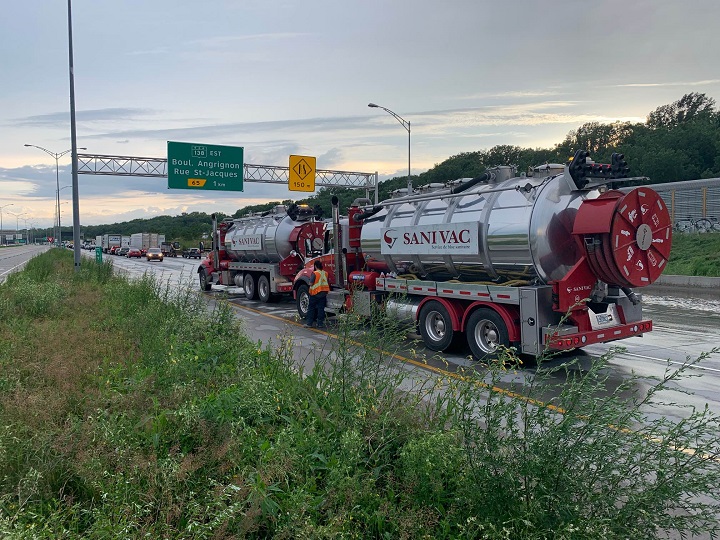Environment Canada confirmed one tornado touched down north of Montreal and a second is suspected to have hit southwest of the city as severe thunderstorms ripped across eastern Ontario and Quebec on Thursday.

The confirmed tornado was in a field near the airport in Mirabel, Que., where there were no reports of injury or damage, Environment Canada spokesperson Katarina Radovanovic said.
The other tornado is suspected to have hit an area with no built infrastructure in Salaberry-de-Valleyfield, Que., also causing no damage, she said.
Monica Vaswani, a warning preparedness meteorologist with Environment Canada, said the agency had received reports of other rotating cloud formations that may have produced tornadoes in Ontario and Quebec, but it was unable to confirm additional touchdowns.
A flurry of tornado advisories was in effect for parts of southern and central Quebec throughout the day.
Environment Canada downgraded the tornado warning to a watch for the greater Montreal area around 4:30 p.m. after heavy rain and strong winds hit the region. A severe thunderstorm warning was also issued for the city at that time.
The weather agency said atmospheric conditions remained favourable for thunderstorms that could lead to tornadoes in the afternoon and evening.
“This is a dangerous and potentially life-threatening situation,” the weather agency said. “Be prepared for severe weather. Take cover immediately, if threatening weather approaches.”
Montreal Mayor Valérie Plante took to Twitter Tuesday evening to warn motorists and commuters that the storm had led to water accumulation in several of the city’s streets and major arteries, as well as some metro stations.
Quebec 511 warned the Décarie was closed in both directions due to water accumulation between the Turcot Interchange and Highway 40.
There was also flooding on Highway 20 near the St-Pierre Interchange, with traffic at a standstill.
Sanivac cleanup service trucks were called in to try to remove some of the water from the road on Highway 20. Vehicles were being forced to make U-turns before the Angrignon Street exit, with provincial police and transport ministry workers directing traffic.
“Throughout the city, our teams are working hard to ensure your safety and limit the damage caused by torrential rains. Vigilance remains in order. Plan your trips and drive carefully,” Plante wrote on Twitter.

Get daily National news
“To report situations related to municipal infrastructure or facilities or to report flooding, contact 311. If you are in an emergency, contact 911.”
The downpour began just before the rush hour, with Montrealers taking to social media to post photos of flooded roads, with motorists sitting on the roofs of their vehicles.
In the downtown core, one person showed what appears to be flooding at the Plaza Alexis-Nihon.
According to Plante, the city’s Centre-Sud borough was particularly hard-hit.
She said that emergency shelters and facilities would be opening up to welcome those in the neighbourhood who need assistance.
Meanwhile, a lightning alert that was in effect at Trudeau International Airport was lifted at around 7:30 p.m.
“Airport operations are now gradually returning to normal,” airport officials said in a tweet.
“Make sure to check your flight’s status with your airline. Thank you for your patience and understanding.”
Environment Canada says in the event of a tornado, it’s best to seek shelter in a room on the lowest floor of a strong building and away from outside walls and windows. Residents should not stay in mobile homes, vehicles, tents, trailers or other forms of free-standing shelter.
If a tornado touches down, the weather agency says “as a last resort, lie in a low spot and protect your head from flying debris.”
Earlier in the day, Quebec Public Security Minister François Bonnardel took to social media to urge residents to follow instructions from local authorities.
“Caution is in order,” he wrote.
- Attack on Iran triggers global flight disruptions, impacts Canadian travellers
- WWE Hall of Fame ring belonging to wrestling legend recovered after stolen
- Carney calls for protection of civilians as U.S., Israel strike Iran
- Queen’s University students stranded in Doha after Iran attack shuts down airspace
Power outages across the province
Hydro-Québec said a combination of different weather events left about 500,000 households in the dark at its peak around 3 p.m.
Wildfires in the James Bay region triggered “grid protection mechanisms” and led to power outages, according to the public utility.
“We currently have three high-voltage transmission lines unavailable for this reason, but our facilities have not been damaged. This situation is causing the vast majority of outages in the Laval, Montreal and Montérégie regions. Our teams are working to restore power gradually over the next few hours,” it said.
Storm systems tracking east have also resulted in some power outages.
Hydro-Québec said it remained on high alert in connection with current weather conditions.
“The system remains unpredictable and the situation is changing rapidly. These events are beyond our control and could lead to outages.”
While its teams remained mobilized and ready to intervene, Hydro-Québec suggested people recharge the batteries of their electronic devices.

— with files from The Canadian Press and Global News’ Tim Sargeant











Comments
Want to discuss? Please read our Commenting Policy first.